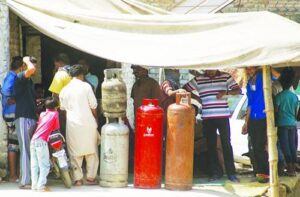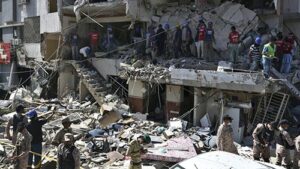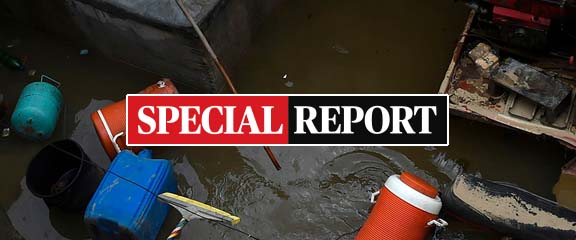Every major city in Pakistan has been witnessing cylinder blasts on a regular basis these days, but after every mishap all the hue-and-cry usually dies down within one or two news cycles spanning over 24 to 48 hours. The use of substandard gas cylinders is being quoted as the main cause of such blasts which frequently kill or injure unsuspecting citizens, mainly women. The number of these incidents has increased in recent years, especially during winters, against the backdrop of the pressing gas shortages due to the depleting local gas reserves and the government’s failure to take timely decisions about the import of Liquefied Natural Gas (LNG).
Generally, in urban Pakistan, gas cylinders were not used by domestic users, but the paradigm has shifted because of the acute gas shortages. Amidst the lingering gas crisis, citizens have been forced to look for alternative energy sources, including the Liquefied Petroleum Gas (LPG) cylinders, coal, wood or biofuel. In the urban centres, there has been a growing trend of operating cylinders in kitchens for domestic use.
Karachi, which is responsible for 60 percent of Pakistan’s economic output, remains engulfed by a myriad of problems — from poor infrastructure to an acute housing crisis for the low-income group and from power shortages and urban flooding to the failing municipal services. The acute gas shortage every winter is the latest addition to their every growing list of challenges.
Despite the implementation of a load-management plan by the Sui Southern Gas Company (SSGC) in Karachi, many residential areas remain completely deprived of gas for days at a stretch. The problem aggravates as many users have installed pressure pumps that deprive their neighbours of even low-pressure gas. That’s the reason that many citizens are forced to buy LPG cylinders for domestic use. Residents of Kharadar, Meethadar, Orangi Town, Korangi, Liaquatabad, Baldia, Sher Shah, Maripur, Gulshan, Ranchorlane, North Karachi, Saddar, DHA, Punjab Colony, Moosa Colony, Hijrat Colony, Landhi, Malir and Surjani Town are the worst hit due to the unavailability of gas or its low pressure. Residents of these areas say that they are meeting household needs mainly through LPG cylinders and sometimes they have to refill the cylinders before going to work — the same as fetching potable water has been practiced in this city for years.

With the shortage of gas for domestic consumers in Karachi, LPG cylinders and stoves connected with cylinders have seen a surge in demand. The surge in the demand for cylinders has also pushed up their prices, which is a new financial burden for the more than 60 percent of Karachiites that live in informal settlements and belong to a low-income group. In most low-income localities, citizens are unable to buy good-quality or branded cylinders and are forced to go for substandard, cheaper, light-sheet options, including stoves directly connected with cylinders. But these cheaper options are unsafe as they often catch fire and explode. These life-threatening alternatives are sold openly in the market where there is hardly any regulatory framework applied on their manufacturers or sellers.
This new problem has proved more lethal for the women as they are the ones who are mainly responsible for running the kitchen. While endangering the lives of the users of these cylinders, this situation is taking its toll on many Karachiites not just financially, but adding a new psychological pressure on them. Are the decision-makers considering how it is affecting homes, where performing even the most basic daily chores has become an uphill task.
LPG is also costlier than natural gas, adding to the financial woes of the low-income residents. A family generally paying a gas bill of below Rs. 500 per month to the SSGC, now spends at least Rs. 3000 per month on LPG. Those who avoid the use of the cylinders, are forced to buy Roti and even cooked food from restaurants, every day, which adds to their daily budget.
As the sale of the substandard gas cylinders continues, the administration seems to have turned a blind eye to the issue. LPG cylinders are also widely used in motor-rickshaws, public transport like buses and vans, and even school vehicles, putting the lives of commuters at great risk. While the use of LGP cylinders in the transport sector remains an old problem, their growing use in homes has added a new dimension to this problem. It is not an exaggeration to say that countless homes in Karachi are infested with ticking-bombs in the form of these substandard LPG gas cylinders, leaving the society to fend for themselves when a blast occurs.
Awareness is also a big issue. In most parts of the civilized world, public service and safety messaging happens on a regular basis, but this hardly happens in Pakistan where commercial interests dominate the media. There is an urgent need for an awareness campaign regarding this issue which hardly finds space in the traditional mainstream media.
The SSGC can also play its role in mitigating this problem of the people by at least issuing a time schedule of its gas load shedding as well as by launching a drive against those users who have installed gas pressure pumps in their homes and even run their small electricity generators on gas. This practice is rampant in affluent areas including Clifton and DHA.
There is a need to create awareness among the people on how to operate the cylinders, as well as what minimum quality is required to ensure safety. The golden rule of ‘safety first’ must be ingrained in them. At the same time, affordability and availability of good-quality cylinders is important for the general public. For this, the federal and provincial governments need to act.

Ali Azmat, a renowned health and safety expert, has a piece of advice; “there are some steps to follow in case of gas cylinder use; general instructions include continuously checking connection tubes and switches, don’t forget to tightly close the valve after each use, don’t place the cylinder near a heat source and make sure there is no flammable material placed near them.”
In case of gas leakage, the safety guidelines tell us that the place should be well ventilated. But in Pakistan’s low-income localities, the size of the kitchen is usually small and there is hardly any proper ventilation.
The government also needs to regulate and curb the business of small-scale and substandard refilling shops, where untrained hands serve the customers in a reckless manner.
With the country’s natural gas reserves depleting every year, the situation will be worse in the next season. Therefore, the time for the government to act is now to ensure the safety of the citizens.
To avoid future tragedies, the SSGC will have to announce load-shedding schedules for different areas across Karachi, while the state institutions will have to reorient themselves towards public safety and take on ground measures, including halting the manufacture of substandard cylinders and selling of LPG in the informal sector.

The writer is an Urban Planner & Geographer, working as Senior Research Associate/GIS Analyst at Karachi Urban Lab, IBA.


